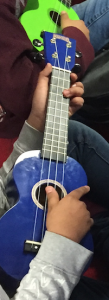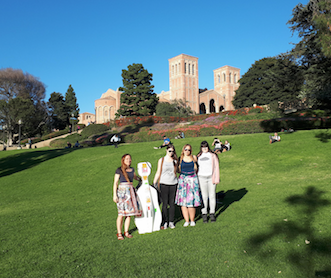A week ago I was in Los Angeles with a small group of my students and one of my colleagues. We lived together, travelled together, worked together, performed, taught, improvised, and laughed. It is a final-year credit bearing class at the University of Chichester that started as a student initiative four years ago. The first group’s story became a book (you can download it for free via the link) and they named the initiative Musiquality, bringing quality and connection through music and education. Each year since the students have created an educational outreach project that touches the lives of children and adults, and inevitably changes their own lives as well.
This year the students involved in the trip raised over £1000 performing at gigs and busking and I raised money too, giving a benefit concert and through leading my community orchestra. Together we raised just under $2000 and bought 60 ukuleles to use in workshops and then donate to the establishments we visited.
California
This is no jaunt down the road, we travelled across the globe to California. Someone at my fundraising concert asked me, ‘Why don’t you just go to the next county over? Take the students to Surrey or Kent? Why do you go so far?’ It’s a good question, and there is something about stepping completely out of your ‘bubble’ and changing many of the normal factors of life and learning. See in America the landscape is different, the school system is different, the people are different, however there is one (almost) common factor: the language. I say almost because although on both sides of the pond we speak English, there are so many cultural and colloquial differences that there is a real need for clarity in communication to ensure understanding, especially when teaching people a new skill – and even more so when that new skill involves a fun bright blue ukulele. The order of operations is essential or the excitement of play might just take over.
The students plan
the teaching content and the logistics of the trip. I make initial connections with colleagues in America and send out a blanket invitation to engage with what the students have to offer and then the negotiations of specifics that we can accommodate happen jointly with the students. Room arrangements, route maps, pre-travel plans with visas and ESTAs, additional insurance – the students deal with all of that. The class is about integrating all the theoretical learning that has happened across their degree and building on the role-play and smaller workshops they have undertaken, and taking it into the realm of real life. As a professional it is important not only to be able to deliver that one hour-long session, but to be confident in planning for and navigating the other bits of the puzzle to get you there.
 We taught a dozen workshops across the week –
We taught a dozen workshops across the week –
at two primary schools and at UCLA. At UCLA the workshop was to teach the university students who volunteer to run the UniCamp sessions how to play the ukuleles and how to teach their summer campers how to play. We were giving them an intro of how to teach and play so they could pass it on and use it in their summer programme.
The primary schools involved direct contact with the children. We performed to over 500 children and workshopped with over 300 in their individual classrooms. Strumming and singing, learning to follow a conductor showing when to play and when to rest, learning the complexities of watching young brains control individual fingers to change chords. There was great fun and great challenge. The wonderful thing was how overwhelmingly happy everyone was during the sessions. The schools we visited were not in affluent areas and most of the children did not know what a ukulele was and they had certainly never played one. Each school was gifted 20 instruments so they could continue with the music, enabling class groups to use the instruments.
At one school the principal didn’t realise they got to keep the instruments. After the day’s teaching we asked where should we leave the instruments and the principal realised we were not taking them back- I will remember the look on her face forever.
Real life
There is something about being in real life where you make the decisions and really control what happens and all the little factors that contribute to the outcomes that is so very rewarding. It is unlike any other ‘school trip’; they aren’t handed an itinerary. The students decide what happens and they learn from everything. They learn from the teaching, learn from the children, learn from adapting on the spot to the different layouts and dispositions of each group they meet. Teaching children is different to teaching the UCLA students who were the same age as my students, and that is different to teaching the UniCamp board members at a dinner party held in a private residence. Each situation affords a new real-time application of musical, communication, and life skills.
Employability?
Speaking with a recruiter form an IT corporation, he said that in graduate interviews he looks for enthusiasm and the soft skills – communication skills, initiative, and evidence that the candidate want to work in this area -none of these are ‘academic’ but are all about attitude, because the technical requirements can be easily taught.
This trip tests the technical, but also the attitude because people are in real situations across formal and informal teaching settings, but also in unsuspecting places. Here are two brief examples:
1. We went on a walk to see a waterfall. (well there was no water because it has been so dry in California, but the walk was beautiful.) The students were very aware of one another, and on the return, one of the students said to me, let’s go get the car and collect the others so they don’t have to walk the incline on the way back. -It was true, one person was finding the up and down a challenge coming from flat old England, but didn’t say it. It was the awareness and sensitivity to others that struck me. How simple it would be to just think of yourself. A good teacher is aware of the progress and learning of her students and adapts whenever possible to include and facilitate the best learning experience for all.
2. The second example involves me. I wanted to go to the grocery store in the evening so there would be breakfast, as I had run out of everything. The grocery store was near the metro station, but a 15 min walk from the hostel. We had returned by metro from a long day and I said I’d catch them all up. They were all going to walk back together. I set off down the street to the store. I was nervous to go alone, for no particular reason, but I am rubbish at directions and we were staying in the centre of Los Angeles. I’m confident at many things, but directions… nope! I came out of the store and turned the corner, galvanising myself for the walk, took a deep breath, and then saw that everyone had waited.
They stood there and waited the whole time I was in the store. My worry faded like spring run-off water when I saw them. I don’t know how they came to the decision, if they consciously realised that they would be helping me- realised how they were considering others and demonstrating leadership – but they did. This was a team, and I am so pleased to have been there with them.
Throughout the trip I could rely on any member of the group to plan, pack, prepare, be aware of others, and to keep me driving on the right. 🙂
Every individual had challenges and each person walked right up to their figurative edge, looked over, and found a way to fly.
A bit of sunshine (music and words):
There is so much more to say, and there were other aspects of the trip beside teaching like our engagement with the Grammy Museum which needs a whole post of its own. For now I am grateful to everyone who went on the trip and to all those we came into contact with during the week. I leave you with two things, some music and a piece of writing. The audio extract is of the UCLA UniCamp board members strumming along and shouting ‘hey!’ in the last verse of the Polish folk song Hej Sokoly. You can also hear Kenn Heller, former Asst. Dean at UCLA on guitar and Paul Ackerley, Senior Lecturer in Musical Theatre at Chichester, joining in on hammered dulcimer. What a musical feast we had! Sylwia sang in Polish, April led the ukuleles, and Elise kept us all in time on the bodhran. -nearly forgot, I’m on cello too! 🙂
One of the children summed up the feeling well in this extract from a piece of reflective writing they did after our visit. (This particular child heard our performance, but their year group was not in the workshops)
There is something hugely special about sharing education with others, and even more so when it involves so much joy. Next year will be a totally different Musiquality project. Students will apply to take the class, will fundraise, and will create a new teaching outreach that aligns with their individual instrumental/vocal specialisms and their career goals. If you are interested in connecting – drop me a line.

